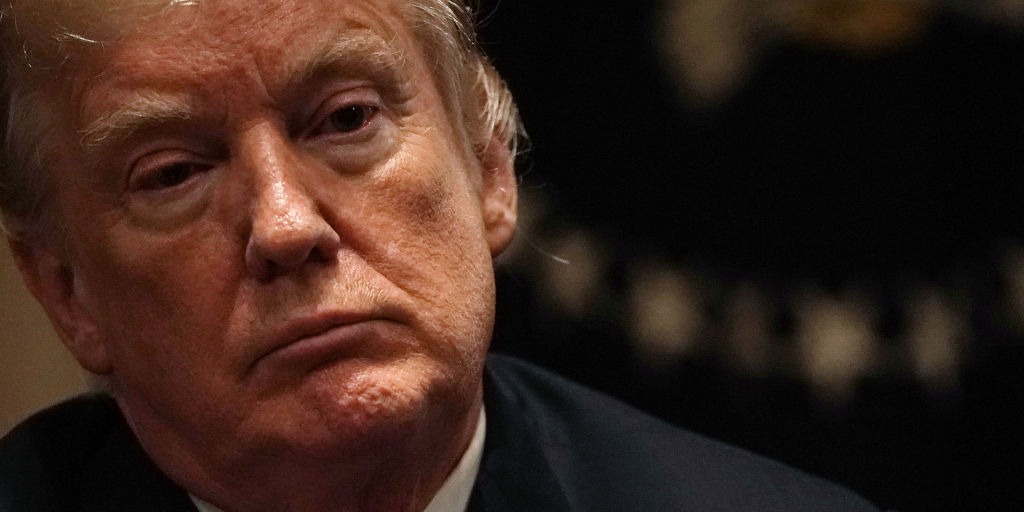- President Trump announced that the US would impose tariffs on imports of steel and aluminum.
- The move is a concrete step toward the more protectionist trade policies the president has promised.
- The decision will most likely prompt retaliation from other countries, including China.
- Increased trade protectionism could result in retaliatory measures and a broader trade war, experts say.
- Stocks sold off after the announcement, with the major indexes falling as much as 2%. Domestic metal producers soared on the news.
President Trump on Thursday said the US would soon impose new tariffs on imports of steel and aluminum, a move that could trigger significant economic repercussions.
“We’re going to build our steel industry back; we’re going to build our aluminum industry back,” Trump said.
The president said the tariffs, which are taxes on imports, would be 25% for steel and 10% for aluminum. In a meeting with executives from steel and aluminum producers, Trump said the tariffs would be rolled out next week to help bolster the US metal industries.
“We’ll be signing it next week. And you’ll have protection for a long time in a while,” Trump told the executives. “You’ll have to regrow your industries; that’s all I’m asking.”
Following the announcement, the stock market took a turn down, with the Dow Jones industrial average falling more than 500 points, or 2%, at one point.
'Unfair trade and bad policy'

These figures are higher than the 24% tariff on steel and 7% tariff on aluminum that the Commerce Department recommended in a February 16 report. Reports indicated Trump was leaning toward 25% on steel because it is a "round number."
"Our Steel and Aluminum industries (and many others) have been decimated by decades of unfair trade and bad policy with countries from around the world," Trump tweeted Thursday morning. "We must not let our country, companies and workers be taken advantage of any longer. We want free, fair and SMART TRADE!"
The decision was set off by a Section 232 investigation, a move that allows the Commerce Department to evaluate the national-security risks of certain imports and to recommend trade restrictions.
These investigations are supposed to evaluate whether the reliance on imported goods poses a risk to national security in the event of a geopolitical incident and combat such practices as steel dumping by China. The Trump administration has undertaken a slew of these investigations with pending reviews on items such as uranium.
The decision to implement tariffs even stronger than the Commerce Department's recommendations is a blow to many White House advisers who favor a more free-trade stance, including Gary Cohn.
The tariffs would most likely trigger retaliation from other countries. China is already looking into restrictions on US exports of sorghum and soybeans, both of which are important crops for American farmers. Additionally, the EU was said to be mulling tariffs on US agricultural products like cheese and bourbon.
In the worst case, a trade war could emerge, with countries rolling out ever more protectionist trade policies in response to one another's moves. Trade officials such as Roberto Azevedo, the director general of the World Trade Organization, have warned against that possibility.
Inflationary pressure
Economists worry that increased trade protections on steel and aluminum could cause the downstream prices of goods that use those products to increase, leading to inflationary pressures in the US economy.
For instance, beer producers responded to the Commerce Department's recommendations with a warning that an aluminum tariff could drive up the cost of beer cans and then what customers pay.
While these price jumps could be limited to a few sectors or goods, the possibility of increased protectionist activity from Trump and retaliatory measures by other countries poses a greater problem for the US economy.
With investors and economists already keeping a close eye on inflation and the Federal Reserve's reaction to price increases, Trump's move could also spark concerns of a broader economic slowdown.
Following Trump's announcement, the major US stock indexes dipped into the red with all three major US indexes falling more close to 2% apiece. Domestic metal producers, however, soared on the news, with US Steel's stock jumping over 5%.

